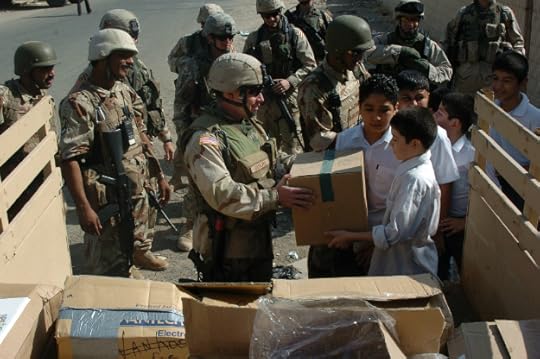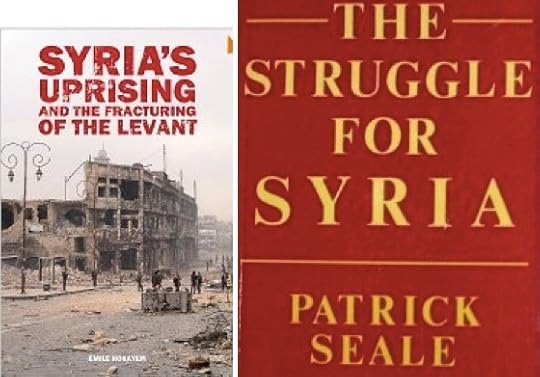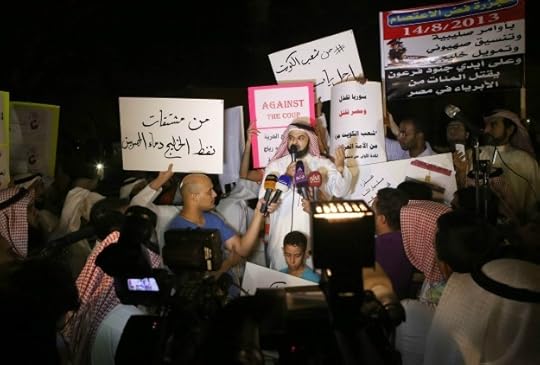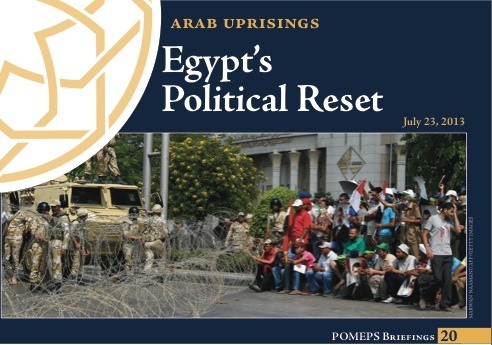Marc Lynch's Blog, page 98
May 21, 2014
Obama Has Spent Seven Years Promising to Fix the VA. Too Bad He Hasn’t Done So.
From Russia With Love (And a Discount)
Introducing FP's Newest Channel: Tea Leaf Nation
September 29, 2013
The American-Iraqi Encounter

The absence of Iraqi voices from American discussions about Iraq over the last decade has long been a major shortcoming. The bookshelf of English-language books about the decade of war with Iraq overflows with accounts of Washington inter-agency battles, General David Petraeus, American soldiers in the field, General David Petraeus, and General David Petraeus. Some are excellent, some less excellent. But very few of them seriously incorporate the experiences, views, or memories of Iraqis themselves -- a problem of American-centric analysis which I termed "strategic narcissim".
And so, on Thursday, October 3, I'm proud to be hosting a really fascinating and hopefully important conference at the Elliott School of International Affairs at The George Washington University called "The Encounter." Each panel at the full-day event will include both Iraqi students who lived in Iraq during some of the years of the war and American students who served those same years in the U.S. military in Iraq (including several Tillman Military Scholars). The keynote lunch session will feature a discussion about American policy and the Iraqi experience between me, former Deputy Assistant Secretaty of Defense for the Middle East Colin Kahl and the Iraqi historian Abbas Kadhim. The agenda is open-ended, and the discussions about how Americans and Iraqis viewed one another should be extremely frank and direct.
If you're in the Washington DC area, I hope that you'll be able to join us for all or part of this event at GW on October 3. I don't usually advertise GW events over here at FP, but I really feel like this one is special, and a long time in the making. An open, frank dialogue about the American experience in Iraq which incorporate diverse American and Iraqi perspectives should be extraordinarily interesting and productive. You can RSVP for the event here, and I look forward to seeing people there and sharing their feedback on the discussions.
September 4, 2013
A Syria Reading List

So you want to read up on the issues surrounding Syria, but you aren't satisfied with the usual list of -- often outstanding, sometimes less so -- think tank reports, blogs and op-eds which usually get offered up? Well, here's a selection of some of the most useful books for making sense of what's happening in Syria now and what might be coming. They aren't going to give you the kind of immediate situational intelligence to make sense of current events, of course, or directly address the issues posed by the current policy debates, but they will leave you a lot more informed about Syria.
The very best book for all this is probably Patrick Seale's sadly out of print The Struggle for Syria: a
definitive, highly readable account of an earlier era of regional proxy
wars over Syria. I'm shocked that it doesn't seem to be available at an affordable price, but get your hands on it if you can.
On current events, I'd start with Emile Hokayem's Syria's Uprising and the Fracturing of the Levant. Stephen Starr's Eyewitness to an Uprising is a nice read. Asad biographer David Lesch's The Fall of the House of Asad gives useful insights into the mindset of Syria's President. Some of the chapters in the recently published Middle East Authoritarianisms, edited by Steve Heydemann and Reinoud Leenders, are very insightful. There's also that The Arab Uprising book that some FP blogger wrote.
There's some good choices on Syria's political economy and the formation of the state. Heydemann's Authoritarianism in Syria is a fine account of the emergence of an authoritarian state in the period leading up to 1970. Bassam Haddad's Business Networks in Syria is really good on the political economy underpinnings of the regime. Nikolas Van Dam's updated version of The Struggle for Power in Syria gives a good sense of the nature of political conflict in Syria's history.
Thomas Pierret's new book Religion and State in Syria offers some unique insights into the role of the Syrian ulema, while Rafael Lefebvre's Ashes of Hama will be useful on the Syrian Muslim Brotherhood if it's ever released in the United States. There's also this "after-action report" by Abu Musab al-Suri on the reasons for the failure of the last jihad in Syria, courtesy of Will McCants. I'm quite enjoying Daniel Neep's new book Occupying Syria, on the role of violence during the French occupation; pity about the price tag. Lisa Wedeen's Ambiguities of Domination might not seem directly relevant to the current crisis, but there's really just no way I'm not going to recommend that you read it. Oh, and of course Hanna Batatu's 7,269 page Syria's Peasantry, the Descendant of its Lesser Rural Notables, and Their Politics doesn't just have a catchy title, it can also be used to kill zombies or hold up a collapsing wall.
Meanwhile, it couldn't hurt to have a look at Fanar Haddad's Sectarianism in Iraq to get a sense of how these antagonisms developed next door. Toby Matthiessen's brand new Sectarian Gulf might help make sense of just what the Saudis might be up to (hint: probably not promoting Syrian democracy). While you're at it, why not dust of your old copies of Tom Ricks' Fiasco and Nir Rosen's Aftermath for a reminder of just how often these things go according to plan. The Logic of Violence in Civil War by Stathis Kalyvas is pretty essential for all purposes in life; and if you like that one then have I got a list of relevant books on civil wars and insurgencies and international intervention for you!
Happy reading. There are many more, of course -- I'm sure you'll all
quickly remind me of the ones I forgot! -- but this should at least be a
nice start.
August 18, 2013
Gulf Islamist Dissent Over Egypt

King
Abdullah of Saudi Arabia issued an unusually rapid and strong
endorsement of the Egyptian military crackdown on the Muslim Brotherhood's sit-ins, calling on all Arabs to unite behind a
crackdown on terrorism, incitement, and disorder. Bahrain, the UAE, and Kuwait
rapidly backed his stance. But many of the most popular and influential Saudi
and Kuwaiti Islamist personalities disagreed vehemently and publicly. Indeed, a
popular
hashtag quickly appeared on Twitter: "King Abdullah's Speech Does Not
Represent Me." [[BREAK]]
There is a long history of Islamists challenging official
policy in Saudi Arabia and Kuwait, of course. But even if the uproar could quickly fade away or be absorbed into
politics as usual, particularly if the violence dies down in Egypt, it's worth
paying attention to the growing, intense public divide between these Islamist
personalities and official policy over Egypt. Even more than domestic politics, the impact might be felt most strongly
in Syria -- where the same voices now criticizing the support for Egypt's
crackdown have been at the forefront of mobilizing public support for the
Syrian opposition.
The most public backlash thus far came with Saudi Prince
Waleed bin Talal's sudden
removal of the popular Kuwaiti Islamist personality Tareq al-Suwaidan from al-Risala
TV over his support for the Muslim Brotherhood and criticism of the Egyptian
military coup. Waleed posted his letter
dismissing Suwaidan on Twitter, with the terse declaration that "there is
no place for any member of the Muslim Brotherhood in our group" and explaining
that Suwaidan had "confessed to his membership in the terrorist Brotherhood
movement."
Suwaidan was vocal indeed in his criticism of the
crackdown, but he was hardly alone. The condemnation of Egypt's crackdown and of the official Gulf support extends across
multiple Islamist networks and prominent personalities. The popular Kuwaiti
Islamist personality Nabil el-Awadhi,
for instance, raged that "the blood of innocents in flowing in Egypt ... the
murderers unleash their bullets without mercy and lay siege to mosques and burn
them ... and they want you Muslims to watch in silence!" When the Saudi Abd al-Aziz Tarefe tweeted
that "what is happening in Egypt is a war against Islam," he received 1584
retweets in 24 minutes.
When I started tweeting about these responses, a lot of Saudis quickly pointed me to Mohammed bin Nasir
al-Suhaybani. Suhaybani had delivered a
sermon at the Prophet's Mosque in Medina denouncing the crackdown, and arguing that whoever supported the coup bore the responsibility for the bloodshed and
had God's curse upon them. The video, posted to YouTube, has received hundreds of thousands of views. His rapid banishment quickly generated a popular hashtag
in his defense ("Shaykh Suhayban Represents Me") -- which resonated uneasily
with the hashtag "King Abdullah's Words Do Not Represent Me."
Few have been more outspoken than the influential Saudi
Islamist Salman al-Awda, who tweeted in English on August 15:
"Whoever helps a murderer - whether by word, deed, financial
support, or even a gesture of approval - is an accomplice. Whoever remains
silent in the face of murder to safeguard his personal interests is an
accessory to the crime." Surrounded by dozens of Arabic tweets blaming the
Egyptian military for said crimes, the implications for the official Saudi
position were difficult to miss. "It is
clear who is driving Egypt to its destruction out of fear for their own
selves," he tweeted. "I am with those whose blood is being shed and against
those who are blindly going about killing people."
That seems to be in line with the most
popular responses among the politicized Islamists of the Gulf. Examples abound. Ibrahim
Darwish, in a video posted two days ago, was particularly incensed by the
"monstrous crime" of Muslims killing Muslims. The Saudi professor Abd al-Aziz
al-Abd al-Latif on August 16
complained about the official framing: how could it be that "supporting the
coup and financing butchers and traitors is not fitna and not terrorism and not intervention in the affairs of
Egypt, but fitna is calling for the
rights of the downtrodden?" Another popular Islamist personality, Hajjaj
al-Ajmi, declared "there is no doubt that the Gulf regimes participating in
shedding the blood of Egyptians deserve the
curse of God." Others were more careful in their criticism, or focused on
the need to avoid bloodshed, but their sympathies seemed clear. Mohamed
al-Arefe declared himself on August 15
to be "with Egypt in my heart and my position and my preaching," calling on
Egyptians to "avoid violence, preserve the calm, do not wash blood with blood." A'idh al-Qarni pleaded for all sides to show restraint.
This public, intense Islamist anger over official policy
toward Egypt could have domestic political ramifications, at least at the
margins. The co-optation
of the Sahwa Islamist networks
was a key part of the Saudi survival strategy in the early days of the Arab
uprisings. Key sahwa figures such as Salman al-Awda have been increasingly
critical, however, as with his scathing open letter on the need for
political reform released in March. The argument over Egypt may further push
them apart. As for Kuwait, criticism over Egypt plays
into its interminable political crisis, and will likely only intensify the
existing polarization. After opposition movements including the Islamic
Constitutional Movement organized
a protest outside of Egypt's Embassy, a leading pro-government
politician warned
ominously against any sign of penetration by Egyptian Muslim Brothers. None of this is likely to lead to an uprising or the like, but it puts the monarchs in an unaccustomed defensive position.
The greater impact might be felt in Syria, however. These Islamist networks
and personalities have been instrumental
in building support and raising
money for the various factions of the Syrian opposition. Now, they are prominently equating Egypt's
General Abdel Fattah al-Sissi with Syria's President Bashar al-Assad. Suwaidan,
for instance, proclaims that "the right is clearly with the revolutionaries in
Syria and with those who adhere to legitimacy and reject the coup in Egypt."
What will happen if the Islamist networks which have been working to support
the Syrian opposition begin to turn their fundraising and mobilizational
efforts to Egypt?
July 23, 2013
Egypt's Reset

The Middle East Channel Editor's Blog
How should
analysts understand the combination of the June 30 massive popular mobilization
and the July 3 military coup against then-President Mohammed el-Morsi? Should these events be understood as a continuation
of the January 25 revolution, a second revolution, a straightforward military
coup, or a restoration of the Mubarak-era order? Does the blame for the failure
of Egypt's first popularly elected Presidency lie with Morsi and the Muslim
Brotherhood, with a recalcitrant opposition, with a resistant state, or with
the deep problems which any transitional leadership would have confronted? Can
a pathway towards a democratic order still be found?
Egypt's Political
Reset, the latest in the POMEPS Arab Uprisings Briefing Series, collects fifteen recent Middle East Channel and Foreign Policy essays written by academics
grappling with these issues. The essays range widely across a diverse
range of interpetations and analysis. They include historical
comparisons and cross-national
comparisons alongside close examinations of the Egyptian
police, the
military,
the
state,
and the Muslim
Brotherhood. These essays eoffer no analytical consensus nor a clear path forward -- and nor should they. [[BREAK]]
The level of analytical disagreement and the intensity of the public
contestation over the interpretation of these events has been quite striking. It
is not
simply a question of listening to Egyptians: no more of a consensus on
these core questions exists in Egypt than in the academic or analytical
communities. Many Egyptian activists, academics, political analysts and
politicians have been at great pains to convince outsiders that their efforts
represented a revolution and not a coup. The abuses of democratic process by
the Morsi government and the massive numbers in the streets as an alternative
measure of the popular will, they argue, outweigh Morsi's claimed electoral
legitimacy. Morsy's own mistakes and refusal to compromise, the anti-democratic practices which occurred under his watch, and the escalating
risk of civil war forced
the SCAF's hand. The June 30 rebellion, in this view, should be seen in the
same light as the January 25 revolution, with a mobilized street rejecting the
imposition of a new authoritarianism by unaccountable elites. The military should be applauded for saving democracy from Islamist takeover.
Skeptics are more
impressed by the July 3 coup and the restoration
of the Mubarakist state. They see little cause to celebrate the military
overthrow of Egypt's first elected President, no matter how miserable his
performance in office. The military removing an elected President, suspending
the constitution, and arresting leaders of the former government are the very
definition of a coup. Nor are many of the supposedly distinguishing features of
Egypt's experience unique: coups are often preceded by popular mobilization and
happily received by opponents of the former regime. Coups do sometimes
lead to the restoration of democracy, but the record of authoritarian
regimes in the Middle East delivering on their promises to cultivate civil
society, deliver effective technocratic governance, and prepare society for real democracy is not strong.
Events since the coup offer highly mixed signals for what
might be coming. Optimists are cheered by the appointment of a relatively competent government which includes key liberal icons such as Mohammed
el-Baradei and promises of early elections and rapid
constitutional reforms. In addition, many of those hostile to the Muslim
Brotherhood are enthusiastic about the crackdown on the group regardless of
whether it leads to democratic reforms.
Others are troubled by the wave
of pro-military nationalism in the media, reports of coordination between
protest organizers and the military ahead of June 30, the ongoing mobilization
by pro-Morsi forces, the severity of the
July 8 attack on a pro-Morsi demonstration and ongoing violent clashes, the support for the new
government by
anti-democratic and anti-revolutionary Gulf regimes, and the seeming return
of many features and faces of the old Mubarak regime.
However events play out, Egypt's uprising and coup have laid bare deep questions
about the meaning of democracy and the sources of legitimacy in its emerging
political order. Critics of the Morsi government pointed with justification to its
majoritarian view of democracy and attempts to grab power, while its
defenders highlighted the repeated interventions by the courts,
including the dissolution of Parliament. What does this mean for the construction of a new
political consensus in the midst of deep polarization and the absence of any
democratically legitimate political institutions? While the ballot box may not be the only source of
democratic legitimacy, it is a crucial one. Democracy can not simply mean "rule
by those with whom the analyst agrees." Nor is it possible to build a genuinely
democratic order around the exclusion of the Muslim Brotherhood, a significant political force in spite of
its political mistakes and the intense hostility it now generates among many
Egyptians. The popular mobilization around the rejection of the
Brotherhood's abuse of state power suggest the continued potency of a mobilized
Egyptian public, at least when its grievances align with the preferences of the
military and elites. Competing
mobilizations in the streets are a poor substitute for elections as a mechanism
for determining levels of popular support, and run the risk of perpetual instability and failed governance.
The essays in Egypt's
Political Reset cover a wide range of these intensely debate issues. It
might usefully be read with the March 2013 POMEPS Brief Egypt
Policy Challenge, which compiled the suggestions by more than a dozen top analysts on how the U.S.
might most usefully support democratic change in Egypt. That phase of Egypt's
tortuous transition has ended, for better or for worse, but what will replace
it remains
very much in
doubt. We hope that the essays
collected in Egypt's Political Reset help to place these events into perspective and offer some insights into the challenges to come.
Download Egypt's Political Reset here. Featuring Michael Albertus, Zaid al-Ali, Khalil el-Anani, Alanna van Antwerp, Nathan Brown, Daniel Brumberg, Steven Cook, Fawaz Gerges, Michael Wahid Hanna, H.A. Hellyer, Marc Lynch, Shana Marshall, Tarek Masoud, Victor Menaldo, Dina Rashed, and Robert Springborg.
Marc Lynch's Blog
- Marc Lynch's profile
- 21 followers



